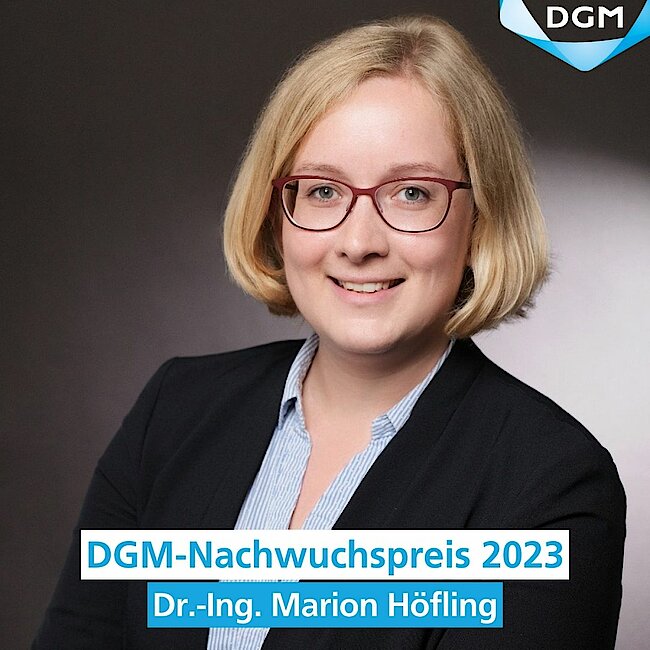
We present the DGM Young Talent Award 2023, which honors outstanding doctoral students who graduated no more than two years ago at the time of application. This prestigious award is dedicated to young scientists who have made exceptional contribution to non-profit research in the field of materials science and engineering. The DGM congratulates Dr.-Ing. Marion Höfling, Schott AG, on receiving the DGM Young Talent Award 2023.
1. Dear Dr. Höfling, you became a DGM member during your master's studies from 2011 to 2016 at the TU Darmstadt, and in 2018/2019 you were the spokesperson for the young DGM and thus a member of the board. To what extent has the professional association accompanied you on your career path?
When we founded the Young-DGM in Darmstadt in 2015, it was a fascinating opportunity to get to know how an association works, which represents our field of interest and at the same time, get the chance to organize new events locally and meet like-minded people in Germany. Over the course of time, the German Materials Society became a constant companion from my Master to PhD and later to my PostDoc career. A deep dive into the DGM structure and gaining insight into the discussion culture and decision-making process and being an active part of it in the Young Talent Committee and the Executive Board as a representative of the Young-DGMs was an educational and defining life experience. Besides, in both roles, as Young-DGM representative and as a regular participant in conferences like the MSE, the manifold options, that were offered for young scientists (e.g. “Meet the expert” etc.) helped to broaden the view and lowered the barrier to talk to experts about science but also career perspectives. Besides that, almost, all by itself, it was possible to get to know a lot of fascinating and inspiring people, create a Materials Science Network and find new friends. Therefore, I am grateful that the DGM is part of my business life and I hope that this will continue.
2. Your scientific career has been characterized by international collaborations, publications, awards and research stays. What influences have these experiences had on your professional and personal development?
That is a complex question. In my opinion, the experience to work in intercultural, international and interdisciplinary teams and/or live abroad for a longer period is priceless. During my scientific career, I received an impression of completely different communication styles, hierarchy levels, leadership types, decision-making processes etc. These experiences did not only trigger my curiosity but also helped to reflect on my own surrounding, and work environment and self-reflect my own actions, evaluation of situations and the own communication style. Of course, also the scientific exchange with collaborators all over the world and getting the chance to investigate our ferroelectric samples with a wide scope of techniques from TEM to phase-field simulations to piezoelectric measurements paved the way for a deeper scientific understanding and finally enabled us to publish comprehensive studies in well-established journals and gain recognition in the functional ceramics field. All of this helped to shape further my personality and influence directly or indirectly my career choices in the past and the future.
3. In his laudation, Prof. Dr. Jürgen Rödel honored you as an ideal ambassador between industry and scientific institutions for Germany and abroad. What is your appeal in this respect to the MSE community and in particular to young scientists?
First of all, I would like to thank Jürgen for the extremely kind words and I will try to do my best to fulfill them.
My appeal would be: Stay open-minded and stay in contact. Academia and industry are two sides of the same coin, as long as they communicate, they will help and learn from each other. To DGM and the MSE-Community, please make sure that “old-fashioned” knowledge doesn’t get lost due to hypes; they will be needed in the future. For young scientists and students, keep your eyes open for chances and take them when they appear. Often a detour leads you much further than the allegedly straightway. If you know both sides of the coin, you can decide much better which one you prefer or if you already know that, you might get a better understanding of the other side. Furthermore, keep in mind that each hype has an end and there will be another one, but the physical, mathematical and chemical basics are timeless.
Thank you very much, Dr. Höfling for the interview. We look forward to meeting you in person at the DGM-Tag.
![[Translate to English:]](/fileadmin/_processed_/f/0/csm_logodgm-4_b2722eeace.png)
![[Translate to English:]](/fileadmin/user_upload/logodgm-4.png)